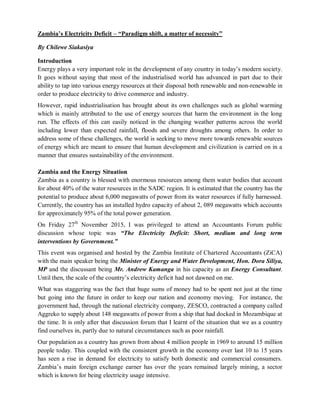
Zambia's Electricity Deficit - Paradigm shift, a matter of necessity_Chilewe Siakasiya
- 1. Zambia’s Electricity Deficit – “Paradigm shift, a matter of necessity” By Chilewe Siakasiya Introduction Energy plays a very important role in the development of any country in today’s modern society. It goes without saying that most of the industrialised world has advanced in part due to their ability to tap into various energy resources at their disposal both renewable and non-renewable in order to produce electricity to drive commerce and industry. However, rapid industrialisation has brought about its own challenges such as global warming which is mainly attributed to the use of energy sources that harm the environment in the long run. The effects of this can easily noticed in the changing weather patterns across the world including lower than expected rainfall, floods and severe droughts among others. In order to address some of these challenges, the world is seeking to move more towards renewable sources of energy which are meant to ensure that human development and civilization is carried on in a manner that ensures sustainability of the environment. Zambia and the Energy Situation Zambia as a country is blessed with enormous resources among them water bodies that account for about 40% of the water resources in the SADC region. It is estimated that the country has the potential to produce about 6,000 megawatts of power from its water resources if fully harnessed. Currently, the country has an installed hydro capacity of about 2, 089 megawatts which accounts for approximately 95% of the total power generation. On Friday 27th November 2015, I was privileged to attend an Accountants Forum public discussion whose topic was “The Electricity Deficit: Short, medium and long term interventions by Government.” This event was organised and hosted by the Zambia Institute of Chartered Accountants (ZiCA) with the main speaker being the Minister of Energy and Water Development, Hon. Dora Siliya, MP and the discussant being Mr. Andrew Kamanga in his capacity as an Energy Consultant. Until then, the scale of the country’s electricity deficit had not dawned on me. What was staggering was the fact that huge sums of money had to be spent not just at the time but going into the future in order to keep our nation and economy moving. For instance, the government had, through the national electricity company, ZESCO, contracted a company called Aggreko to supply about 148 megawatts of power from a ship that had docked in Mozambique at the time. It is only after that discussion forum that I learnt of the situation that we as a country find ourselves in, partly due to natural circumstances such as poor rainfall. Our population as a country has grown from about 4 million people in 1969 to around 15 million people today. This coupled with the consistent growth in the economy over last 10 to 15 years has seen a rise in demand for electricity to satisfy both domestic and commercial consumers. Zambia’s main foreign exchange earner has over the years remained largely mining, a sector which is known for being electricity usage intensive.
- 2. The 2014/2015 rainfall season saw the country experience less than expected rainfall and brought to the fore the need for to diversify away from dependence on rain-fed power generation. It could well be that the country might run at even as low as half of its current installed capacity resulting in a slowdown in the economy by the end of 2016. The Need for a Paradigm Shift The situation calls for a shift in the way that we as a nation generate our power going forward. I am aware for instance that the government has been engaging a number of potential investors to help address the deficit but those efforts alone may not be enough to help us out of our dependence on hydro-electric power and effectively only worsen the current deficit. What I believe this calls for is a collective approach to tackling the current deficit on all fronts, be it domestic, commercial or at governance level. I know, for instance, that there has been an initiative taken to waive duty on importation of renewable energy products such as solar. In recent years, we have seen massive infrastructure development with expansion of existing road networks both in the rural and urban areas of our country. I am of the view that for those roads that are earmarked for street lighting, the government should consider attracting and compelling contractors to use renewable sources of energy in order to ease the burden on the national power grid. Perhaps as citizens, we may also need to play a part by considering alternative sources to provide us with the much needed power for our domestic purposes. This would help in freeing up demand and reduce the strain on the national electricity supply grid. I think that it is possible for us to reach a point where most of the power generated by the national electricity company could be up for export thus earning our country some additional foreign exchange. The SADC region and beyond provides a good market for us and must therefore take advantage our central position. Conclusion The first 50 years since independence has seen the country utilising only about 30% of its potential in terms of hydro-electric power generation. Perhaps the next 50 years should see us exploit the remaining 70%. In addition, we should take an aggressive path towards harnessing wind, solar and other forms of energy sources in order to not only turn around but safeguard our future fortunes as a country. References: 1. Energy Sector Profile, 2014 by the Zambia Development Agency (ZDA) 2. Ministerial Statement On The Power Deficit By Hon. Dora Siliya, M.P., Minister Of Energy And Water Development - November, 2015 3. Zambia in Figures booklet: 1964 – 2014, a compilation of the Central Statistical Office of Zambia
